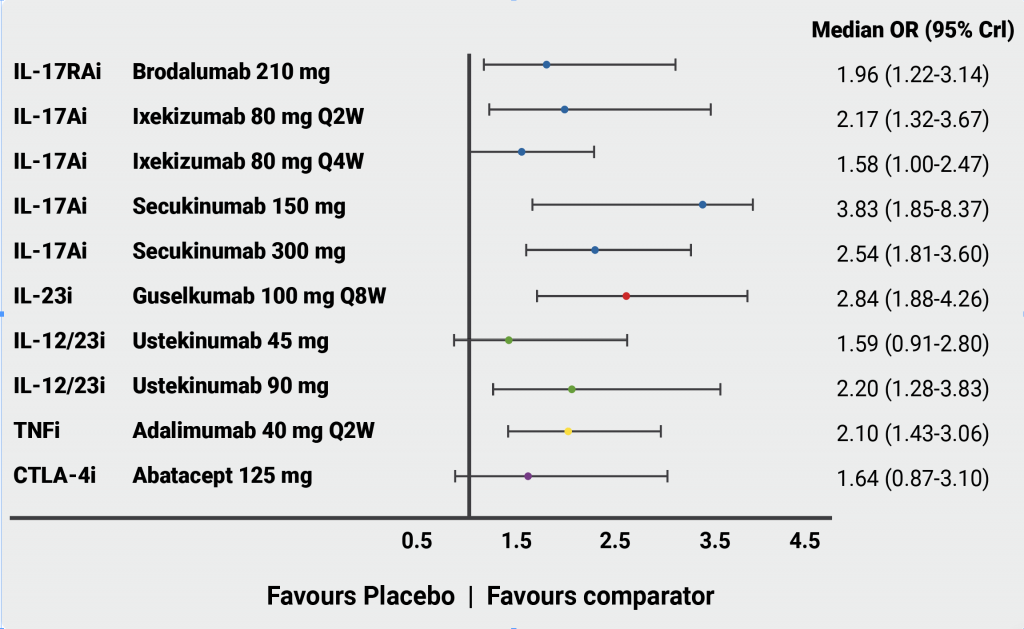https://doi.org/10.55788/8c342df4
The risk of developing psoriasis is higher in people with obesity [1,2]. A Danish cohort of participants who underwent bariatric surgery (n=12,364) showed a decreased risk of psoriasis (HR 0.52; 95% CI 0.33–0.81), severe psoriasis (HR 0.44; 95% CI 0.23–0.86), and psoriatic arthritis (HR 0.29; 95% CI 0.12–0.71) following gastric bypass surgery [3]. In a similar Swedish study including 1,991 participants with bariatric surgery and 2,018 controls who had obesity with a follow-up of up to 26 years, the risk of developing psoriasis was lower in participants who underwent surgery (HR 0.65; 95% CI 0.47–0.89; P=0.008) [4]. Furthermore, a longer duration of obesity at baseline was associated with developing psoriasis independently of surgery (HR 1.28; 95% CI 1.05–1.55; P=0.014). “So obesity, not only from a medical perspective but from a societal, political, and healthcare perspective, is very important to the risk of getting immune-mediated inflammatory disorders,” said Prof. Mrowietz [2].
Paediatric obesity
In a meta-analysis of multiple studies, paediatric psoriasis was significantly associated with overweight (OR 1.58; 95% CI 1.14–2.19; P=0.006) and obesity (OR 2.45; 95% CI 1.73–3.48; P<0.001) [5]. Moderate-to-severe childhood psoriasis was more commonly associated with obesity than mild childhood psoriasis (OR 1.66; 95% CI 1.16–2.37; P=0.005). Furthermore, childhood psoriasis was also associated with higher odds of diabetes, metabolic syndrome, and cardiovascular disease (i.e. ischaemic heart disease or heart failure).
Understanding the link between obesity and psoriasis
Adipocytes are metabolically and immunologically active cells, with immune cell recruitment to adipose tissue leading to chronic inflammation. “Being obese not only means that adipocytes are more active but it also means that they increase in number,” explained Prof. Mrowietz. “The problem then is that in those patients who are counselled to lose weight the number of adipocytes is not decreased; they will stay the same, so the rebound is more predictable.” Also, obesity leads to an increase in immune cells and interleukins involved in the development of psoriasis, as well as disruption of regulatory T-cell pathways [6].
Treatment options for obesity-associated psoriasis
Prof. Mrowietz thinks that GLP-1 receptor agonists such as tirzepatide and semaglutide could be the solution [2]. A case report published in 2023 described resolution of psoriasis (PASI score drop from 12 to 0.2) following 10 months of semaglutide treatment in a 50-year-old woman with a BMI of 30 kg/m2 and disease refractory to ixekizumab, secukinumab, and guselkumab [7]. However, these results will need to be confirmed in larger studies.
“Obesity is causing psoriasis but psoriasis is not causing obesity, and obesity is an independent risk factor for psoriatic disease,” concluded Prof. Mrowietz [2]. “Management of obesity and its impact is key,” continued Prof. Mrowietz, adding that administration of GLP-1 receptor agonists could be a solution for an integrated approach to treatment.
- Mrowietz U, et al. J Eur Acad Dermatol Venereol. 2023;37(9):1731-1738.
- Mrowietz U. Obesity and psoriatic disease – an ominous relationship. IFPA Conference 2024, 27–29 June, Stockholm, Sweden.
- Egeberg A, et al. JAMA Surg. 20171;152(4):344-349.
- Maglio C, et al. Obesity (Silver Spring). 2017;(12):2068-2073.
- Phan K, et al. Pediatr Dermatol. 2020;37(4):661-669.
- Bradley D, et al. Annu Rev Physiol. 2024;86:199-223.
- Malavazos AE, et al. Endocrinol Diabetes Metab Case Rep. 2023;2023(3):23-0017.
Copyright ©2024 Medicom Medical Publishers
Posted on
Previous Article
« Managing obesity and fibromyalgia in psoriatic disease Next Article
Depression complicates the management of psoriatic disease »
« Managing obesity and fibromyalgia in psoriatic disease Next Article
Depression complicates the management of psoriatic disease »
Table of Contents: IFPA 2024
Featured articles
Multiple novel oral agents show promise in psoriasis
Advances in psoriasis treatment: topical therapies show promising results
Personalised Medicine and Genetics in Psoriatic Disease
How close are we to personalised medicine in psoriatic arthritis?
Genetic and immunological advances in risk assessment and treatment of psoriatic diseases
Using advances in the genetics of psoriatic disease to better predict treatment response
Comorbidities and Complications in Psoriatic Disease
Depression complicates the management of psoriatic disease
The unfavourable role of obesity in psoriatic disease
Managing obesity and fibromyalgia in psoriatic disease
Advances in Psoriasis Treatment
Multiple novel oral agents show promise in psoriasis
Biologics for psoriasis: towards oral therapies and less frequent dosing
Advances in psoriasis treatment: topical therapies show promising results
Special Populations and Psoriatic Disease
Improving outcomes in pregnancy and psoriatic disease
Towards prevention of psoriatic arthritis in patients with psoriasis
Diagnostic Challenges and Disease Management
Itch and pain are major components of psoriatic disease and require management
Can diet help with the management of psoriasis?
Biologics in psoriatic arthritis: where we are and where we are headed
Related Articles
September 17, 2021
Vaccination feasible in people with psoriatic disease

July 21, 2022
How to treat enthesitis in 2022
© 2024 Medicom Medical Publishers. All rights reserved. Terms and Conditions | Privacy Policy
HEAD OFFICE
Laarderhoogtweg 25
1101 EB Amsterdam
The Netherlands
T: +31 85 4012 560
E: publishers@medicom-publishers.com

